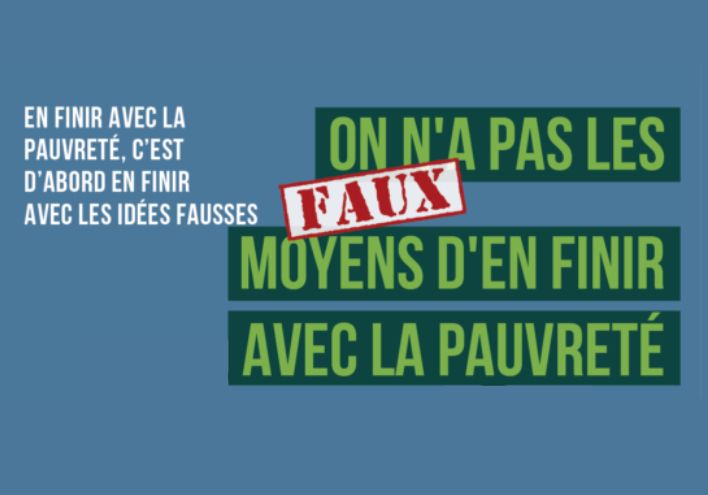That’s Not True! ATD Canada’s Campaign Against Misconceptions

This article was originally published on ATD Fourth World Canada’s website.
Video clips opposing misconceptions
As part of their vast campaign to overcome misconceptions about poverty, ATD Fourth World Canada created a series of videos in French, see an example.
These video clips are tools that help enrich our efforts to restore a fair perspective on people experiencing poverty. Postcards and the campaign’s support manual are also online free of charge (currently available in French only). Hard copies are also available to order.
- Too many misconceptions about poverty negatively influence people in power—those who develop programs and implement poverty-reduction services. This too often means that these actions miss their mark. Already, people with inadequate income suffer even more from the social judgment imposed by these misconceptions.
We have the means to put an end to poverty
If we believe that people in poverty do not want to work and that a person can live well on government assistance, we will undoubtedly maintain the illusion that fighting poverty is costly. These misconceptions influence societal decisions. However, what is truly costly is not acting against poverty: a bed in a homeless shelter costs $1,932 (CAD) per month, a stay in prison costs $4,333 (CAD) per month, and a hospital bed costs $10,900 (CAD) per month 1.
In Quebec, the indirect costs of poverty are estimated at $17 billion (CAD) 2.
However, a recent study has estimated that with $3 billion (CAD), the Government of Quebec could ensure that everyone’s basic needs are met3.
Therefore, increasing income for those most impoverished would benefit everyone, as these funds would circulate within the local economy, not to mention the reduction in healthcare and legal fees. Additionally, over a decade, the number of families relying on government aid decreased by 46% because the Government of Quebec increased financial aid to families4.
Rethink our view of poverty
The International Monetary Fund (IMF) states that when the wealthiest individuals in a country accumulate wealth, the nation’s overall wealth diminishes. Conversely, when those in poverty increase their income, wealth rises, benefiting everyone5.
These findings lead us to rethink our view of poverty and our strategies to eliminate it while respecting the dignity of those who experience it.
Ending extreme poverty starts with dispelling misconceptions.
Find That’s Not True! campaign videos here
More about ATD Fourth World’s work in Canada
- Gaetz, S., Donaldson, J., Richter, T., and Gulliver, T. (2013). The State of Homelessness in Canada 2013. Toronto: Canadian Homelessness Research Network Press.
- Centre for Study on Poverty and Exclusion. (2012). Cost of poverty in Quebec according to Nathan Laurie’s model
- Québécois Observatory for Inequality. Quel serait le coût d’augmenter les prestations d’assistance sociale au niveau de la MPC? (What would be the cost to increase government assistance benefits to the level of the Market Basket Measure?) https://observatoiredesinegalites.com/cout-assistance-sociale-mpc/(available only in French)
- Institute for Research and Socioeconomic Information. (2012). Les prestations d’aide sociale sont-elles trop généreuses? Are government assistance benefits too generous? https://iris-recherche.qc.ca/publications/les-prestations-daide-sociale-sont-elles-trop-genereuses (available only in French)/
- International Monetary Fund. (2015). Causes and Consequences of Income Inequality: A Global Perspective. https://www.imf.org/external/pubs/ft/sdn/2015/sdn1513.pdf

